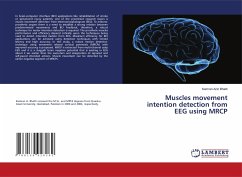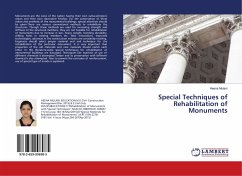
Muscles movement intention detection from EEG using MRCP
Versandkostenfrei!
Versandfertig in 6-10 Tagen
27,99 €
inkl. MwSt.

PAYBACK Punkte
14 °P sammeln!
In brain-computer interface (BCI) applications like rehabilitation of stroke or spinal-cord injury patients, one of the prominent research topics is muscle movement detection from electroencephalogram (EEG). To endorse prosthetic organs there is a need to establish a strong relation between predetermined movements and BCI feedback, therefore, a robust technique for motor intention detection is required. The prosthetic muscles performance and efficiency depend critically upon the techniques being used to detect intended motion from EEG. Maximum efficiency for BCI applications can be achieved us...
In brain-computer interface (BCI) applications like rehabilitation of stroke or spinal-cord injury patients, one of the prominent research topics is muscle movement detection from electroencephalogram (EEG). To endorse prosthetic organs there is a need to establish a strong relation between predetermined movements and BCI feedback, therefore, a robust technique for motor intention detection is required. The prosthetic muscles performance and efficiency depend critically upon the techniques being used to detect intended motion from EEG. Maximum efficiency for BCI applications can be achieved using detection techniques with limited latency and high accuracy. In this study, a robust motion detection technique using movement related cortical potentials (MRCPs) with improved accuracy is proposed. MRCP is extracted from multi-channel scalp EEG and it is a sluggish brain negative potential that is existing in EEG about 2 sec earlier than the execution and imagination of signaled and self-paced intended actions. Muscle movement can be detected by the earlier negative segment of MRCPs.












